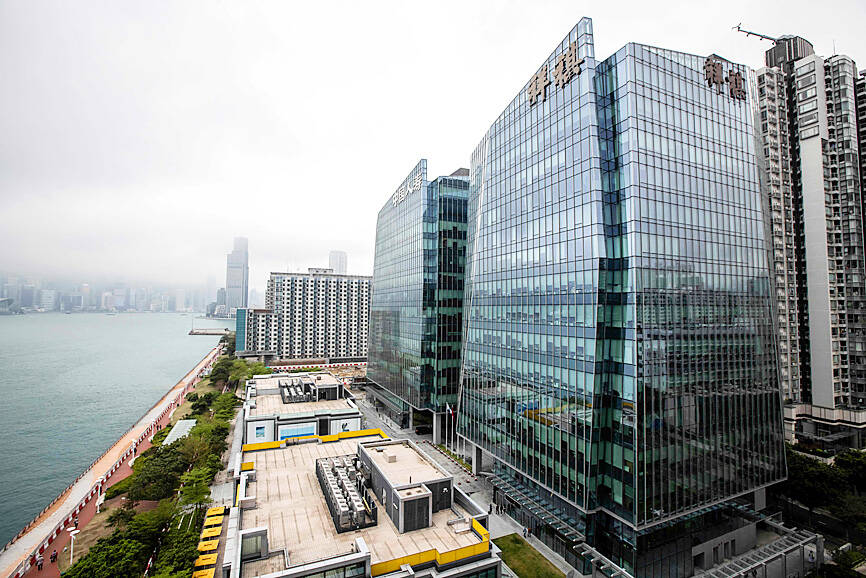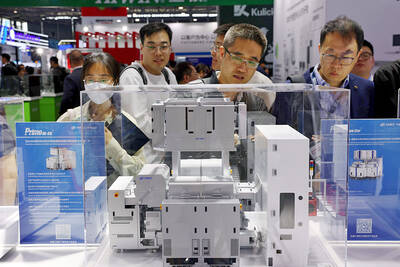Country Garden Holdings Co (碧桂園), China’s largest property developer, reported a first full-year loss since its 2007 listing in Hong Kong.
The Foshan-based company posted a net loss of about 6.1 billion yuan (US$886.5 million) last year, compared with a profit of 27 billion yuan a year earlier. The developer warned of the loss earlier this month.
The result underscores how a slump in China’s real-estate sector is weighing on some of the strongest private builders that have avoided a default so far.

Photo: AFP
While early signs of a housing market stabilization have finally emerged, the turnaround remains tenuous. A chunk of Country Garden’s land bank is in low-tier cities, which usually have higher inventory and weaker housing demand.
Revenue stood at 430 billion yuan, roughly in line with the 427 billion yuan estimate compiled by Bloomberg. Core net profit, which adjusts for items including property revaluation, reached 2.6 billion yuan, the company said.
Meanwhile, a Chinese tycoon’s US$271 million mansion in the luxurious Peak neighborhood of Hong Kong was taken away by a bank, just years after the businessman made headlines with his record-breaking shopping spree.
Chen Hongtian (陳紅天), chairman of Hong Kong-based investment firm Cheung Kei Group (祥祺集團), also had an apartment in the Frank Gehry-designed Opus building and the Cheung Kei Center in the territory’s Hung Hom area seized.
In total, he lost about US$1.4 billion of properties in recent months, in Hong Kong and London, according to data compiled by Bloomberg.
Chen’s plight underscores the liquidity crunch that Chinese real-estate entrepreneurs are facing. He joins a number of tycoons — including China Evergrande Group (恆大集團) chairman Hui Ka Yan (許家印) — in losing control of their luxury properties.
The house on the Peak was taken earlier this month by Bank of East Asia Ltd (東亞銀行), while Bank of Communications Co (交通銀行) seized the Opus apartment last month, documents from the government showed.
On Tuesday, a receiver was appointed for the Cheung Kei Center, according to a Companies Registry filing. It was taken by Hang Seng Bank Ltd (恒生銀行) through PricewaterhouseCoopers LLP.

SEMICONDUCTOR SERVICES: A company executive said that Taiwanese firms must think about how to participate in global supply chains and lift their competitiveness Taiwan Semiconductor Manufacturing Co (TSMC, 台積電) yesterday said it expects to launch its first multifunctional service center in Pingtung County in the middle of 2027, in a bid to foster a resilient high-tech facility construction ecosystem. TSMC broached the idea of creating a center two or three years ago when it started building new manufacturing capacity in the US and Japan, the company said. The center, dubbed an “ecosystem park,” would assist local manufacturing facility construction partners to upgrade their capabilities and secure more deals from other global chipmakers such as Intel Corp, Micron Technology Inc and Infineon Technologies AG, TSMC said. It

EXPORT GROWTH: The AI boom has shortened chip cycles to just one year, putting pressure on chipmakers to accelerate development and expand packaging capacity Developing a localized supply chain for advanced packaging equipment is critical for keeping pace with customers’ increasingly shrinking time-to-market cycles for new artificial intelligence (AI) chips, Taiwan Semiconductor Manufacturing Co (TSMC, 台積電) said yesterday. Spurred on by the AI revolution, customers are accelerating product upgrades to nearly every year, compared with the two to three-year development cadence in the past, TSMC vice president of advanced packaging technology and service Jun He (何軍) said at a 3D IC Global Summit organized by SEMI in Taipei. These shortened cycles put heavy pressure on chipmakers, as the entire process — from chip design to mass

Germany is to establish its first-ever national pavilion at Semicon Taiwan, which starts tomorrow in Taipei, as the country looks to raise its profile and deepen semiconductor ties with Taiwan as global chip demand accelerates. Martin Mayer, a semiconductor investment expert at Germany Trade & Invest (GTAI), Germany’s international economic promotion agency, said before leaving for Taiwan that the nation is a crucial partner in developing Germany’s semiconductor ecosystem. Germany’s debut at the international semiconductor exhibition in Taipei aims to “show presence” and signal its commitment to semiconductors, while building trust with Taiwanese companies, government and industry associations, he said. “The best outcome

Semiconductor equipment billings in Taiwan are expected to double this year, as manufacturers in the industry are keen to expand production to meet strong global demand for artificial intelligence applications, according to SEMI, which represents companies in the electronics manufacturing and design supply chain. Speaking at a news conference before the opening of Semicon Taiwan trade show tomorrow, SEMI director of industry research and statistics Clark Tseng (曾瑞榆) said semiconductor equipment billings in Taiwan are expected to grow by an annual 100 percent this year, beating an earlier estimate of 70 percent growth. He said that Taiwan received a boost from a